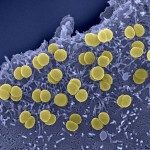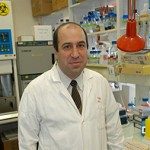Lien vers Pubmed [PMID] – 9224885
Gene 1997 Jun;192(1):149-53
The ability to interact with non-phagocytic cells is a crucial virulence attribute of the meningococcus. Pili play a major role in this process and are the only means yet discovered by which capsulated bacteria may adhere to cells. Pilus-mediated adhesion is a two-step process which requires (i) the expression of the adhesin PilC1 and (ii) the expression of an appropriate pilin variant. Some pilin variants have the ability to modify the degree of adhesiveness through the formation of bundles of pili which increases bacteria-bacteria interactions.

